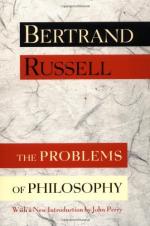|
This section contains 1,184 words (approx. 4 pages at 300 words per page) |

|
Overview
Bertrand Russell's discovery and proposed solution of the paradox that bears his name at the beginning of the twentieth century had important effects on both set theory and mathematical logic.
Background
At about the same time in the 1870s, Georg Cantor (1845-1918) developed set theory and Gottlob Frege (1848-1925) developed mathematical logic. These two strains of theory soon became closely intertwined. Cantor recognized from the beginning that set theory was replete with paradoxes. He, along with other mathematicians and logicians or philosophers of mathematics such as Bertrand Russell (1872-1970), Alfred North Whitehead (1861-1947), and Edmund Husserl (1859-1938), tried to resolve these difficulties.
Cantor himself discovered one of the earliest paradoxes of set theory in 1896. The power set of any set S is the set of all subsets of S. The power set of...
|
This section contains 1,184 words (approx. 4 pages at 300 words per page) |

|


